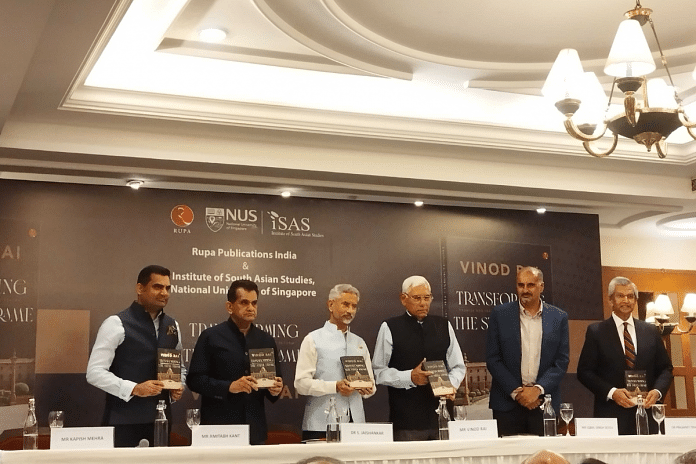New Delhi: When he stepped onto the podium to present a book he edited on reforming the Indian civil services, former Comptroller and Auditor General Vinod Rai was quick to break the ice.
“If I had written the book that Kapish wanted me to write, probably a couple more defamation cases would be filed against me,” he said, looking to his publisher, Kapish Mehra, managing director of Rupa Publications.
Subdued laughter followed, including from fellow panellist and external affairs minister S Jaishankar.
In October 2021, Rai — who served as CAG from 2008 to 2013 and faced allegations of trying to topple the Manmohan Singh government over the 2G spectrum and coal scams — was embroiled in a high-profile defamation case against senior Congress leader Sanjay Nirupam. The latter accused the former CAG of wrongly naming him as one of the MPs who had pressured him not to name former PM Manmohan Singh in the 2G spectrum case. Rai eventually tendered an unconditional apology.
Two years later, Rai is now a distinguished visiting research fellow at the National University of Singapore’s Institute of South Asian Studies (ISAS). He has edited Transforming the Steel Frame: Promise and Paradox of Civil Service Reform — a compilation of suggestions from distinguished personalities such as former Union Public Service Commission (UPSC) chairman Deepak Gupta and billionaire entrepreneur Kiran Mazumdar-Shaw. The essays in the book talk about how the Indian civil services must adapt to modern times.
Contributors to the book also include secretaries in government and Election Commissioners to corporate sector leaders, chartered accountants, international civil servants and more. The book was launched by a six-member panel featuring Jaishankar, NITI Aayog head Amitabh Kant, economist Prajapati Trivedi, ISAS associate professor Iqbal Singh Sevea as well as Rai and Mehra.
Also read: Statue of Unity is central to IAS officers for Modi’s Aarambh course
A steel frame that was once celebrated
Speaking to a packed room at the prestigious India International Centre in Delhi, Rai asked: “Why is it that a steel frame that was so celebrated once upon a time has now become…laid back in some ways?”
This seemed to resonate with the audience, many of whom were former civil servants themselves. Kant, who was part of the same Kerala cadre that Rai was a part of in 1972, also appeared to be nodding.
“At that time, an officer was respected for his work. Kerala was also one of those states where an officer was respected not because he was a bureaucrat or pleased his minister but because of the kind of service he did. Nowadays, even if you want to follow that mindset, you can’t. The system has changed,” mentioned the wife of a former officer who belonged to the same Kerala cadre to ThePrint.
During his address, Rai touched upon corruption in the bureaucracy and the need for ethical governance as well as a sense of integrity in the institutions.
“There will be political interference. We can’t wish it away. We can’t shy away from it. There will be in the bureaucracy – as it is being done now – a proliferation of lateral entrants specialised in their own way…And there will be insidious attempts to damage the moral fibre of that bureaucracy,” he said.
Here, the former CAG was referring to personnel from the private sector who are selected to an administrative post in the government despite not being part of the bureaucratic setup. But despite Rai’s perceptions of lateral entrants, reports show that the Narendra Modi government is happy with them and even extended the tenures of a select few.
Also read: For SMART police, India needs to train constables in law, forensics, tech. Not just…
Need for a tech-centric bureaucracy
During his keynote address, Jaishankar offered remarks from a foreign service angle and called for a “welfare” bureaucracy that is also “tech-centric” and adapts to modern times.
He also turned the long-standing “specialists versus generalists” debate in the Indian civil services on its head.
“The mainstream thinking today, in the top echelons of the government, is that we need a T-shaped model where there’s a broad lateral awareness of the domain, but within that there is some deep specialisations. Then, the generalists and the specialists are not a binary choice — they coexist in the shape of a T,” he explained.
The debate on generalists and specialists arguably began with the rising demand for lateral entrants into the Indian civil services. The Indian Administrative Service (IAS), which was modelled during the British colonial era, is largely viewed as a generalist service where officers hop from one ministry to another through their careers.
But over time and with economic development, there has emerged a higher demand for domain knowledge at the policy level.
“There’s still a lot of hesitation on this issue [lateral entry]. In my view, it’s not decisively settled on the basis of principle. There will be trials and errors. There will be people pointing out remarkable cases of lateral entry. There will be some grumbling about them not knowing the basics of the business,” added the external affairs minister.
As he concluded, Jaishankar remarked that politics and the “steel frame” need to work together and recalled a time when his predecessor, Sushma Swaraj who died in 2019, offered him a golden piece of advice. “She sent me a note that said: ‘Remember, any ministry is only as good as the minister-secretary combination’,” said Jaishankar.
(Edited by Humra Laeeq)



